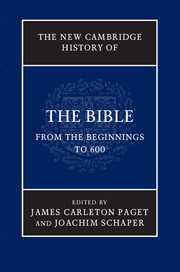Book contents
- The New Cambridge History of The Bible
- Series page
- The New Cambridge History of The Bible
- Copyright page
- Contents
- Figures
- List of contributors
- Preface
- Abbreviations
- Abbreviations of books of the Bible
- Table of Psalm numbering
- Part I Languages, writing systems and book production
- Part II The Hebrew Bible and Old Testaments
- Part III The New Testament
- Part IV Biblical versions other than the Hebrew and the Greek
- Part V The Reception of the Bible in the Post-New Testament Period
- 24 The interpretation of the Bible in the second century
- 25 Gnostic and Manichaean interpretation
- 26 Origen
- 27 Eusebius
- 28 Jerome
- 29 Augustine
- 30 Syriac exegesis
- 31 Figurative readings: their scope and justification
- 32 Traditions of exegesis
- 33 Pagans and the Bible
- 34 Exegetical genres in the patristic era
- 35 The Bible in doctrinal development and Christian councils
- 36 The Bible in liturgy
- 37 The Bible in popular and non-literary culture
- Select bibliography
- Index of manuscripts
- Index of scriptural and related sources
- General index
32 - Traditions of exegesis
from Part V - The Reception of the Bible in the Post-New Testament Period
Published online by Cambridge University Press: 05 May 2013
- The New Cambridge History of The Bible
- Series page
- The New Cambridge History of The Bible
- Copyright page
- Contents
- Figures
- List of contributors
- Preface
- Abbreviations
- Abbreviations of books of the Bible
- Table of Psalm numbering
- Part I Languages, writing systems and book production
- Part II The Hebrew Bible and Old Testaments
- Part III The New Testament
- Part IV Biblical versions other than the Hebrew and the Greek
- Part V The Reception of the Bible in the Post-New Testament Period
- 24 The interpretation of the Bible in the second century
- 25 Gnostic and Manichaean interpretation
- 26 Origen
- 27 Eusebius
- 28 Jerome
- 29 Augustine
- 30 Syriac exegesis
- 31 Figurative readings: their scope and justification
- 32 Traditions of exegesis
- 33 Pagans and the Bible
- 34 Exegetical genres in the patristic era
- 35 The Bible in doctrinal development and Christian councils
- 36 The Bible in liturgy
- 37 The Bible in popular and non-literary culture
- Select bibliography
- Index of manuscripts
- Index of scriptural and related sources
- General index
Summary
- Type
- Chapter
- Information
- The New Cambridge History of the Bible , pp. 734 - 751Publisher: Cambridge University PressPrint publication year: 2013

